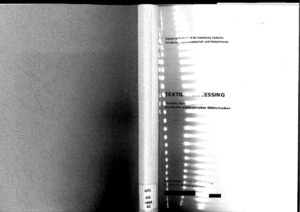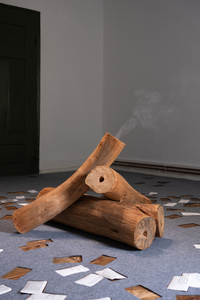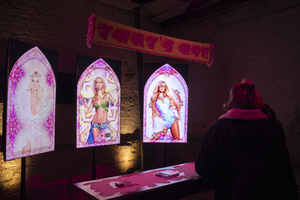ETWAS BLEIBT
Benachbarte Sets (17)Alle Zusammenhänge anzeigen
Diese Sets wurden den gleichen Sets hinzugefügt wie das ausgewählte Set.
17 Inhalte
- Seite 1 von 2
Testzentrum für chronischen Automobilismus
- Titel
- Testzentrum für chronischen Automobilismus
- Autor/in
- Beschreibung (de)
- Radweg Ende, kein Zebrastreifen, Parkplatz voll, Bahn verpasst and stop and go, jemand hupt alle schauen, rote Ampel niemand da, falsch abgebogen, Licht vergessen, vollgas Lichthupe, Überholmaneuver trotz Geschwindigkeitsbegrenzung, ups! Personenschaden, Spiegel abgebrochen, Fenster runter „Arschloch!“, selber! Brumm. Kennen Sie das?
Verkehr ist eine höchst emotionale Angelegenheit. Die vielen kleinen Entscheidungen, die wir im automobilen Individualverkehr treffen müssen, sind immer auch mit einem Risiko behaftet. Sehen wir den "Personenschaden" als Katastrophe an, so müssen wir doch zugeben, dass auch die kleinen Fehlentscheidungen für Stress, Frust und Wut sorgen können. Ebendiese Reaktionen möchten wir im Kontext der sogenannten Mobilitätswende anerkennen, attestieren und aus ihnen Forderungen ableiten, die wir gerne für unsere Besucher*innen an die lokalen Behörden weiterleiten.
Auto, Fahrrad, Zufuß? Egal! Unsere 20-minütige Erstuntersuchung richtet sich an alle Verkehrsteilnehmer*innen. Erfahren Sie fachkundige Beratung und die Anwendung neuester Technologie. Tipp: Buchen Sie schon jetzt einen Termin und vermeiden Sie Wartezeiten. Wir freuen uns auf ihren Besuch!
- Radweg Ende, kein Zebrastreifen, Parkplatz voll, Bahn verpasst and stop and go, jemand hupt alle schauen, rote Ampel niemand da, falsch abgebogen, Licht vergessen, vollgas Lichthupe, Überholmaneuver trotz Geschwindigkeitsbegrenzung, ups! Personenschaden, Spiegel abgebrochen, Fenster runter „Arschloch!“, selber! Brumm. Kennen Sie das?
- Kategorie
- Typ des Projekts/Werks
- Schlagworte
- Datierung
- 25.03.2024 - 28.03.2024
- Mitwirkende
- Sprache
- Material
- Technik/Verfahren/Formate
- GameMaker Studio 2 (Game)
- Abmessungen
- 5 x 7,5 m
- Dauer
- 25 Minuten (Erstuntersuchung)
- Ort: Institution
- Stadt
- Land
- Internetlinks
- Bemerkungen
- Dank an: Alexander Knoppik, Alexander Thelen, Anna Haas (Badisches Staatstheater), Astrid Lindner-Maier, Barbara Kuon, Charlotte Singer, Christian Platz, Cornelia Herzog, Daniel Heiss (ZKM), Dario Schmid, Emelie Schreiner, Felix Fisgus, Franzi Wentz, Isabelle Schneider, Julian Kuf, Laura Richter, Leonie Mühlen, Martin Mangold (ZKM), Marvin Uhde (cant-deci.de), Max Bernhard, Miri, Omni-Mobil GmbH, Paula Schacke (die Anstoss e.V.), Pavel Polenz, Ralph Saam (Scheck-In Center Durlach), Richard Brunner, Sebastian Schäfer, Sebastian Schillbach, Sebastian Schönfeld, Silke Roth (die Anstoss e.V.), Susanne Henneberger (WERKRAUM: Karlsruhe e.V.), Susanne Schmitt, Sven Krahl, Timothée Charon, Tobias Keilbach, Tjark Schönfeld, Ute Wienberg (Badisches Staatstheater), Vlado Petrovic, Waldemar Schwab, Yun-Wen Liu
- Dank an: Alexander Knoppik, Alexander Thelen, Anna Haas (Badisches Staatstheater), Astrid Lindner-Maier, Barbara Kuon, Charlotte Singer, Christian Platz, Cornelia Herzog, Daniel Heiss (ZKM), Dario Schmid, Emelie Schreiner, Felix Fisgus, Franzi Wentz, Isabelle Schneider, Julian Kuf, Laura Richter, Leonie Mühlen, Martin Mangold (ZKM), Marvin Uhde (cant-deci.de), Max Bernhard, Miri, Omni-Mobil GmbH, Paula Schacke (die Anstoss e.V.), Pavel Polenz, Ralph Saam (Scheck-In Center Durlach), Richard Brunner, Sebastian Schäfer, Sebastian Schillbach, Sebastian Schönfeld, Silke Roth (die Anstoss e.V.), Susanne Henneberger (WERKRAUM: Karlsruhe e.V.), Susanne Schmitt, Sven Krahl, Timothée Charon, Tobias Keilbach, Tjark Schönfeld, Ute Wienberg (Badisches Staatstheater), Vlado Petrovic, Waldemar Schwab, Yun-Wen Liu
- Titel
- Testzentrum für chronischen Automobilismus
- Projektleiter/in
- Semester
- Studiengang
- Typ der Abschlussarbeit
- Importiert am
- 31.05.2024
- Übergeordnete Sets
- 1
- Set enthält
- 0 0
Textile Processing
- Titel
- Textile Processing
- Untertitel
- Punkte, Zeilen, Spalten; Vorläufer elektronischer Bildtechniken
- Autor/in
- Beschreibung (de)
- “Die Ähnlichkeiten von Geweben, Mustervorlagen und heutigen Rasterbildern sind eklatant. In einer Genese der technischen Bilder kann das Gewebe als Exemplarfall und Vorreiter aller technisch-elektronischer Bilder gelten.”
“Die ersten Bilder, die von ihrem Bildkörper abgelöst wurden, bestanden aus einem Stapel gelochter Karten für die Verwendung im Jacquardwebstuhl. Der Bildcode ist hier noch begreifbar, das Bild, wenn es aus dem Stapel dieser Karten gewoben wird, ein textil-taktiles Produkt. Patricia Wallers Needle-Works zeigen die Leerstelle heutiger Bildmaschinen auf, wo Bilder auf Monitoren erscheinen, um im nächsten Moment schon wieder durch den nächsten (Netzhaut-) Eindruck ausgetauscht zu werden.”
- “Die Ähnlichkeiten von Geweben, Mustervorlagen und heutigen Rasterbildern sind eklatant. In einer Genese der technischen Bilder kann das Gewebe als Exemplarfall und Vorreiter aller technisch-elektronischer Bilder gelten.”
- Beschreibung (en)
- “The similarities between fabrics, patterns and today's raster images are striking. In the genesis of technical images, the fabric can be regarded as an exemplary case and forerunner of all technical-electronic images.”
“The first images that were detached from their image body consisted of a stack of perforated cards for use in the Jacquard loom. The image code is still comprehensible here, the image, when woven from the pile of these cards, is a textile-tactile product. Patricia Waller's needle works show the blank space of today's image machines, where images appear on monitors only to be replaced by the next (retinal) impression in the very next moment.”
- “The similarities between fabrics, patterns and today's raster images are striking. In the genesis of technical images, the fabric can be regarded as an exemplary case and forerunner of all technical-electronic images.”
- Kategorie
- Typ des Projekts/Werks
- Schlagworte
- Datierung
- 02.11.1998
- Sprache
- Ort: Institution
- Stadt
- Titel
- Textile Processing
- Projektleiter/in
- Semester
- Studiengang
- Typ der Abschlussarbeit
- Archiv-Signatur
- HfG HS 1998 02
- Externes Archiv
- Importiert am
- 11.01.2024
- Übergeordnete Sets
- 0
- Set enthält
- 0 2
The Plenum – A Scripted Play
- Titel
- The Plenum – A Scripted Play
- Autor/in
- Beschreibung (de)
- "The Plenum – A Scripted Play" behandelt das performative, das rituelle und das gemeinschaftsbildende Moment des Plenums als Planungstreffen selbstverwalteter Gruppen im politischen und kulturellen Kontext.
Über den Zeitraum eines Jahres wurden "Plena" in unterschiedlichen Konstellationen durchgeführt, die die gruppeneigene Dynamik untersuchten und auf Basis eines sich verändernden Scripts, einem Theaterdrehbuch oder Code gleichend, in einer kollektiven Performance Ausdruck fanden.
Die dabei von der Gruppe gemachten Erfahrungen dienten nicht nur zur Dokumentation für Gewesenes, sondern wurden als neuer „Input“ sofort in das bestehende Script eingearbeitet. Das sich permanent verändernde Projekt konnte so nach Vorbild eines Computerprogramms transparent gestaltet werden und ermöglichte eine basisdemokratische Beteiligung aller Akteur:innen – unabhängig von präexistentem Wissen oder Erfahrungswerten.
Nach Vorbild von Jo Freemans Essay „The Tyranny Of Structurelessness“ stand das Schaffen offener und klarer Kommunikation bezüglich der eigenen Gruppenstruktur und deren „Balance of Power“ im Mittelpunkt der Treffen.
„The Plenum – A Scripted Play“ ist jedoch nicht nur ein reales Treffen einer politischen Gruppe, sondern schafft seine identitäre Notwendigkeit durch seine Schnittstelle mit der Simulation: Das Finden von Mehrheiten (oder Einstimmigkeiten), die Verteilung von Macht und Autorität innerhalb der eigenen Gruppe sowie der Entscheidungsfindungsprozess wurden in verschiedenen Modellen spielerisch erprobt und in ihren politischen und historischen Kontext eingeordnet. Der fiktive Aspekt der Treffen öffnete Spielräume zur Reflexion über das eigene Verhalten innerhalb von Gruppengefügen. Vielen dieser Simulationen dienten Computercodes, Brettspiele und politische Verfassungen zur Vorlage.
Einem jeden Treffen selbstverwalteter Gruppen wohnt immer – oft unbewusst – etwas Rituelles inne, das zum Schaffen der kollektiven Identität von hoher Bedeutung ist. Das Wiederholen planerischer Abläufe und die kodifizierten, gruppenspezifischen Kommunikationsregeln entscheiden über Zugehörigkeit zur Gruppe und sind identitäts- und sinnstiftend.
Was vom Plenum bleibt, sind Simulationsskizzen, ein (beinahe) gegründeter Verein, eine intensive Auseinandersetzung um Vergütungsmodelle in einer nonmonetären Mikrowirtschaft und das Erarbeiten nachhaltiger Strukturen für die eigene kulturelle und politische Praxis, die sich bis heute fortsetzen. Sichtbar von alledem ist nichts, außer die Spuren, die wir stigmergisch hinterlassen.
Diese Spuren: Der Raum, in dem wir uns treffen; das Feuer, um das wir uns versammeln; die Karten, aus denen wir ablesen können, was einmal besprochen wurde – und werden wird; und das Script, ein sich permanent veränderndes Programm, das es uns vielleicht einmal ermöglichen wird, eine sozial und ökologisch nachhaltige Existenz in der Kunst- und Kulturszene zu führen.
- "The Plenum – A Scripted Play" behandelt das performative, das rituelle und das gemeinschaftsbildende Moment des Plenums als Planungstreffen selbstverwalteter Gruppen im politischen und kulturellen Kontext.
- Beschreibung (en)
- "The Plenum - A Scripted Play" deals with the performative, ritual and community-building moment of the plenum as a planning meeting of self-organised groups in a political and cultural context.
Over the course of a year, "Plena" were held in different constellations, which examined the group's own dynamics and found expression in a collective performance based on a changing script, similar to a theatre script or code.
The experiences made by the group not only served to document what had already happened, but were also immediately incorporated into the existing script as new "input". The constantly changing project could thus be designed transparently, modelled like a computer program, and enabled the grassroots democratic participation of all actors - regardless of pre-existing knowledge or experience.
Inspired by Jo Freeman's essay "The Tyranny Of Structurelessness", the creation of open and clear communication regarding the group's own structure and its "balance of power" was at the centre of the meetings.
However, "The Plenum – A Scripted Play" is not just a real meeting of a political group, but creates its identitary necessity through its intersection with the simulation: finding majorities (or unanimity), the distribution of power and authority within one's own group and the decision-making process were playfully tested in various models and placed in their political and historical context. The fictitious aspect of the meetings opened up scope for reflection on one's own behaviour within group structures. Many of these simulations were based on computer codes, board games and political constitutions.
There is always – often unconsciously – something of ritual inherent to every meeting of self-governed groups, which is of great importance for creating a collective sense of identity. The repetition of planning processes and the codified, group-specific communication rules determine membership of the group and create identity and purpose.
What remains of the plenum are simulation sketches, an (almost) founded association, an intensive debate about remuneration models in a non-monetary micro-economy and the development of sustainable structures for one's own cultural and political practice, which continue to this day. None of this is visible, except for the traces that we stigmergically leave behind.
These traces: the space in which we meet; the fire around which we gather; the cards from which we can read what has been – and will be – discussed; and the script, a constantly changing programme that will perhaps one day enable us to lead a socially and ecologically sustainable existence in the world of art and culture.
- "The Plenum - A Scripted Play" deals with the performative, ritual and community-building moment of the plenum as a planning meeting of self-organised groups in a political and cultural context.
- Kategorie
- Typ des Projekts/Werks
- Datierung
- 07.03.2023 - 18.04.2024
- Sprache
- Ort
- Plenarwohnung, Atelier von K.-J. Overkott, Günther-Klotz-Anlage, Schlosspark, Stephanienstraße (bei Sven), Sophienstraße (bei Tim), auf dem Dach, ßpace.
- Stadt
- Land
- Titel
- The Plenum – A Scripted Play
- Projektleiter/in
- Studiengang
- Typ der Abschlussarbeit
- Importiert am
- 16.06.2024
- Übergeordnete Sets
- 1
- Set enthält
- 0 6
Vakna
- Titel
- Vakna
- Titel (en)
- Vakna
- Untertitel
- Der menschliche Körper. Das Wiederentdecken. Das Akzeptieren. Das Erwachen
- Autor/in
- Beschreibung (de)
- Der menschliche Körper.
Das Wiederentdecken.
Das Akzeptieren.
Das Erwachen.
Diese Gedanken sind der Beginn des Spiels Vakna, einer Gedankenwelt, die sich mit der Wahrnehmung und der Akzeptanz des unbekleideten menschlichen Körpers befasst und dadurch gesellschaftliche Einflüsse hinterfragt.
In dieser Gedankenwelt ist es dem/der Spieler/in möglich durch auffindbare Fragen und Aussagen mehr über sich selbst, die eigene Wahrnehmung, das eigene Verhalten, die eigene Moral und die eigenen rituellen Gedankengänge den menschlichen Körper betreffend herauszufinden.
Die Gedankenwelt Vakna erwacht gemeinsam mit der spielenden Person, welche vielleicht beginnt die eigene Wahrnehmung, das eigene Verhalten, die eigene Moral und die eigenen rituellen Gedankengänge den menschlichen Körper betreffend zu hinterfragen, für sich selbst und gegenüber anderen Menschen neu zu ordnen oder zu verändern.
Am Ende dieses Spiels hat jede Person für sich selbst zu entscheiden, ob das Wiedererwachen des Körpers und damit verbundene „Neu-Erleben“ der Welt ausprobiert oder gelebt werden möchte.
Auch sind die Fragen zu beantworten, wie mit der neugewonnen Akzeptanz und Wiederentdeckung umzugehen ist. Doch hat die spielende Person bei dieser Entscheidung sich nicht dem Spiel gegenüber zu verantworten, sondern sich selbst und den Mitmenschen der Gesellschaft.
Bei diesem Computerspiel handelt es sich um einen Single-Player im Bereich der Serious- und Educational-Games, das mit Tastatur und Maus gespielt werden kann.
- Der menschliche Körper.
- Beschreibung (en)
- The human Body.
The Rediscovery.
The Accepting.
The Awakening.
These thoughts are the beginning of the game Vakna, a world of thoughts that deals with the perception and acceptance of the human body without clothes, thereby questioning social influences.
In this world of thoughts it is possible for the player to find out more about himself, his own perception, his own behavior, his own morality and his own ritual thoughts concerning the human body through discoverable questions and statements.
Vakna awakens together with the player. The player begins to question the own perception, the own behavior, the own morality and the own ritual thought processes concerning the human body and perhaps to rearrange or change them for themselves and for other people.
At the end of this game, each person has to decide for himself whether the body's reawakening and the „re-experiencing“ of the world would be tried out or lived.
Also, the questions to be answered are how to deal with the newly gained acceptance and rediscovery. But in this decision, the player does not have to answer to the game, but to himself and the fellow human beings of society.
This computer game is a single player in the field of serious and educational games that can be played with a keyboard and a mouse.
- The human Body.
- Typ des Projekts/Werks
- Schlagworte
- Datierung
- 21.11.2018
- Mitwirkende
- Sprache
- Material
- Technik/Verfahren/Formate
- Computerspiel für Windows
- Abmessungen
- 3D
- Ort
- Hochschule für Gestaltung Karlsruhe
- Stadt
- Land
- Internetlinks
- Titel
- Vakna
- Importiert am
- 16.11.2018
- Übergeordnete Sets
- 2
- Set enthält
- 1 21
WHERE LEGENDS ARE MADE AND LIES ARE TOLD
- Titel
- WHERE LEGENDS ARE MADE AND LIES ARE TOLD
- Autor/in
- Beschreibung (de)
- WHERE LEGENDS ARE MADE AND LIES ARE TOLD (graduation project). Originated by this divine union of @parishilton @britneyspears @lindsaylohan (aka the Holy Trinity <3) the night of the infamous Bimbo Summit, WLAMALAT is the visual and critical translation of my obsession for the #y2k it-girls and #popculture in general. Mixing a religious with a highly commercial aesthetic, the project questions several topics such as women representation in the mass media, visual/celebrity culture consumption and new belief systems.
- WHERE LEGENDS ARE MADE AND LIES ARE TOLD (graduation project). Originated by this divine union of @parishilton @britneyspears @lindsaylohan (aka the Holy Trinity <3) the night of the infamous Bimbo Summit, WLAMALAT is the visual and critical translation of my obsession for the #y2k it-girls and #popculture in general. Mixing a religious with a highly commercial aesthetic, the project questions several topics such as women representation in the mass media, visual/celebrity culture consumption and new belief systems.
- Beschreibung (en)
- WHERE LEGENDS ARE MADE AND LIES ARE TOLD (graduation project). Originated by this divine union of @parishilton @britneyspears @lindsaylohan (aka the Holy Trinity <3) the night of the infamous Bimbo Summit, WLAMALAT is the visual and critical translation of my obsession for the #y2k it-girls and #popculture in general. Mixing a religious with a highly commercial aesthetic, the project questions several topics such as women representation in the mass media, visual/celebrity culture consumption and new belief systems.
- WHERE LEGENDS ARE MADE AND LIES ARE TOLD (graduation project). Originated by this divine union of @parishilton @britneyspears @lindsaylohan (aka the Holy Trinity <3) the night of the infamous Bimbo Summit, WLAMALAT is the visual and critical translation of my obsession for the #y2k it-girls and #popculture in general. Mixing a religious with a highly commercial aesthetic, the project questions several topics such as women representation in the mass media, visual/celebrity culture consumption and new belief systems.
- Kategorie
- Typ des Projekts/Werks
- Datierung
- 06.12.23
- Dank an
- Ort
- Rudolf 5
- Titel
- WHERE LEGENDS ARE MADE AND LIES ARE TOLD
- Projektleiter/in
- Semester
- Studiengang
- Typ der Abschlussarbeit
- Importiert am
- 05.11.2024
- Übergeordnete Sets
- 0
- Set enthält
- 3 8



